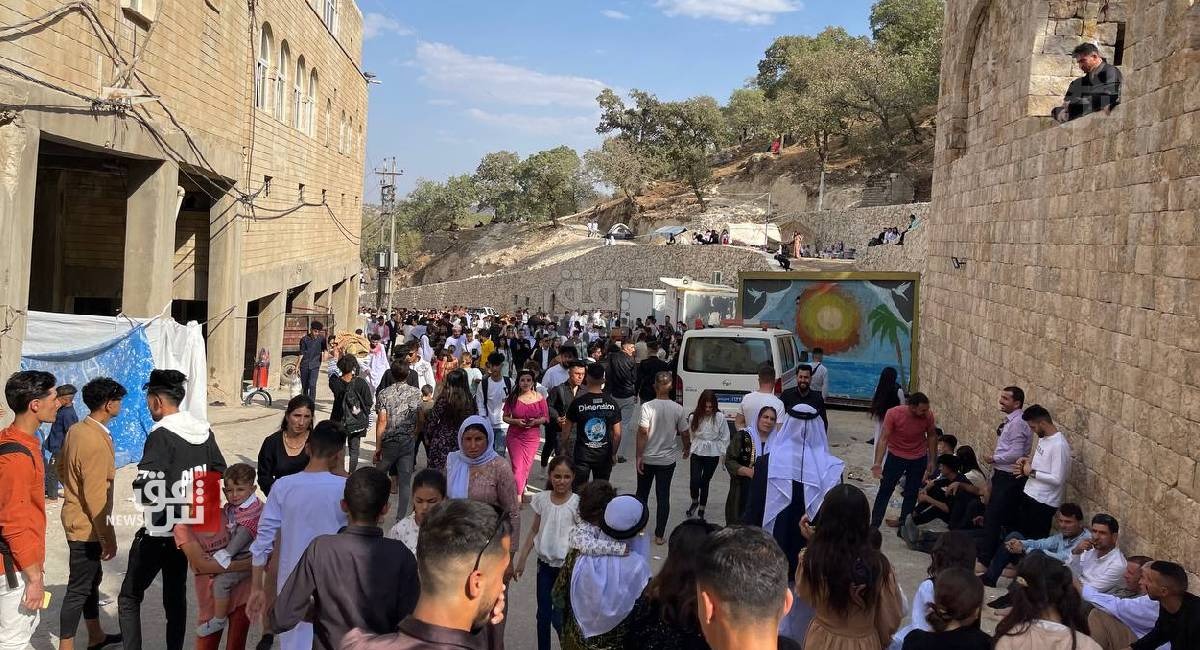Nine years after IS slaughter, Yazidis fight for rights in Iraq

2023-04-16 00:00:00 - From: Shafaq News
Shafaq News/ At the end of March, Yazidis gathered on the grounds of Lalish Temple in northern Iraq for a religious ceremony, the extraction of olive oil for illuminating the temple. It was a reminder that almost nine years after the reactionary Islamic State attempted to wipe them out, the Yazidi people are not going away.
Yazidis are an ethnic minority that practice their own ancient religion. Halwest Karim, who works on aiding their rebuilding efforts, spoke to the Militant at the Erbil International Book Fair in March. She described murderous atrocities committed by IS as it conquered swaths of northern Iraq and Syria in August 2014. “At Kocho and other villages they killed all the men and kidnapped the women and children,” she said.
IS left 80 mass graves during its rampage.
Nearly 1,300 Yazidis were killed and over 6,000 people, mostly women and children, taken and forcibly “converted” to Islam, then pressed into domestic and sexual slavery. Young boys were indoctrinated to try to turn them into IS soldiers. Hundreds of thousands fled to the Kurdistan region of Iraq where most still live in camps. Over 2,700 remain unaccounted for and many families claim they are still in captivity.
The attempted genocide was the culmination of years of attacks by Islamist terror groups, which gained ground in Iraq in the aftermath of the 2003 U.S.-led invasion and occupation. Initially, both Iraqi and Kurdish government forces stood by as the Islamic State attack unfolded. “They abandoned the Yazidi people,” Karim said. “That was the main reason IS could do it. People were begging for weapons.”
Over a year later, a coalition of Syrian Kurdish People’s Protection Units (YPG), Iraqi Kurdish peshmerga (under Kurdistan Regional Government command) and Yazidi Protection Forces retook the Yazidi town Sinjar. They were backed by Washington’s air assaults, which destroyed large parts of the town, a preview of the 2017 bombardment of Mosul and Raqqa, which sealed the fate of the IS territory.
Yazidis fight to rebuild
“When I went to Sinjar in 2018,” Karim said, “the men told me they’re sleeping at day and staying on guard during the night to protect the women.” Elsewhere, Yazidi families have taken abandoned land and buildings and started to rebuild.
Sinjar is among the areas of Iraq under dispute between the federal government in Baghdad and the Kurdistan Regional Government in Erbil. Both governments have been vying for influence there, along with the Iranian and Turkish governments and a range of militias, including those backed by Tehran.
Yazidis have made efforts to move back to their hometowns and rebuild despite widespread destruction, lack of basic infrastructure and ongoing clashes between the forces intervening there. Iraqi government forces launched attacks on Sinjar last year, prompting residents to demand the withdrawal of all armed groups.
“Yazidis don’t feel safe,” Karim said. “There is little support socially or mentally. What they’ve been through is traumatic.”
Karim said authorities and international organizations justify pulling back from providing support by saying the area is unsafe. “But that’s no real answer.”
Two years after the Iraqi government approved a law providing financial support to victims of IS, only some 400 women have received payments. “We have been waiting for two years without receiving a single dinar,” Laila Shammo, a Yazidi woman who with her two daughters escaped IS captivity in 2015, told KirkukNow. “We feel that things are going very slowly.”
With these obstacles to rebuilding in Sinjar, and few openings to integrate into other communities, many Yazidis want to emigrate, Karim said. Some 150,000 fled to Germany from 2015, but that route of emigration has declined sharply in recent years.
“In the Kurdistan region, all camps for others who fled violence elsewhere in Iraq are being closed,” with people being assisted by the Iraqi government to return to the areas they fled. Not the Yazidis.
“Many people in Iraq think this is just a country for Muslims,” Karim said. “But this is the Yazidis’ land! They should be helped to rebuild.”
Islamic State also targeted Christian, Shabak and Turkmen minorities. “Christians never thought about leaving Iraq before, but after the IS attack that changed,” Karim said. Before 2003, there were up to 1.5 million Christians in Iraq. Less than 300,000 remain.
Karim also spoke about efforts to reintegrate women who were kidnapped by IS, especially those who had children as a result of sexual slavery. According to Yazidi tradition, any woman who has sexual relations with non-Yazidis or is raped by a non-Yazidi is excommunicated. While religious figures said they would welcome the kidnapped women back, the same did not apply to their children. Conversion is “impossible,” a religious leader recently told Al-Monitor. Under Iraqi law, a child is considered Muslim if the father is Muslim.
“This is a big issue,” Karim said. “There is a campaign called ‘My mother’s name is my name.’ It calls for the right of women to give children their name if they want to keep them.” She said the Kurdistan Regional Government should change the law, regardless of what authorities in Baghdad do.


